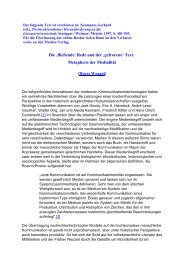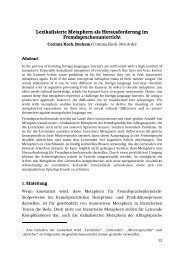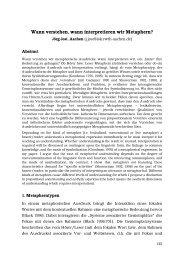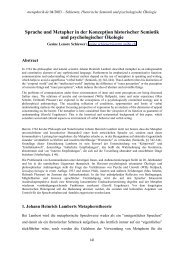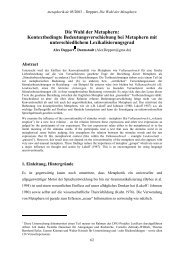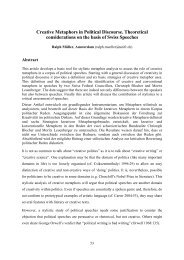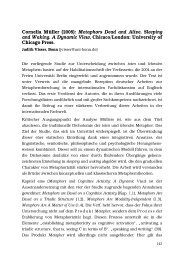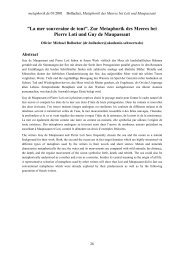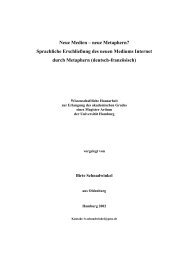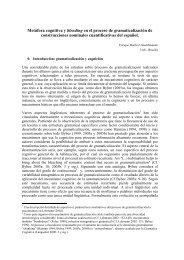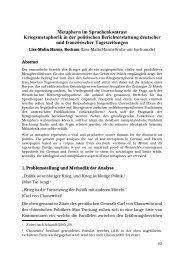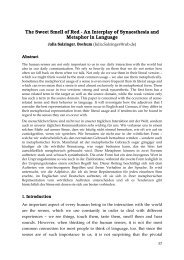Hans Erich Bödeker - metaphorik.de
Hans Erich Bödeker - metaphorik.de
Hans Erich Bödeker - metaphorik.de
Create successful ePaper yourself
Turn your PDF publications into a flip-book with our unique Google optimized e-Paper software.
<strong>metaphorik</strong>.<strong>de</strong> 11/2006 – Rezensionen / Reviews / Comptes rendus<br />
several research programmes in France that could be un<strong>de</strong>rstood as a collaborative work of a<br />
dictionary of social-politic usage in contemporary French, e.g. the project on In/égalité/s<br />
(Fiala, 1999) and the projects around the book series Dictionnaire <strong>de</strong>s usages socio-politiques<br />
du français. Corpus linguists may have wished to have more information about the use of<br />
corpora in this vein of research, as there is a longstanding experience of historical corpus<br />
analysis with the database FRANTEXT in France (134). Guilhaumou, however, puts<br />
emphasis on the problem of how to relate linguistic material with the historical and social<br />
context; he clearly prefers a rather hermeneutic approach to texts, which also addresses the<br />
issue of the abuse of words (142).<br />
Mark Bevir: The role of contexts in un<strong>de</strong>rstanding and explanation (159-208)<br />
This article provi<strong>de</strong>s a more differentiated picture of the Cambridge School, since Bevir<br />
emphasises the differences within the Cambridge School of the history of i<strong>de</strong>as, in particular<br />
between John Pocock and Quentin Skinner. John Pocock, on the one hand, is associated with<br />
a “contexualist” position, “who argue that the meaning of a text <strong>de</strong>rives from the paradigm or<br />
langue to which it belongs” (165) – thus, the ways of thinking, writing and speaking that<br />
exists in their communities <strong>de</strong>termine what authors may say (167). Quentin Skinner, on the<br />
other hand, is associated with a “conventionalist” position “who claim that meanings embody<br />
authorial intentions albeit that authors must express their intentions conventionally” (165).<br />
Thus, the reconstruction of intentions requires a reconstruction of conventions that govern the<br />
treatment of such issues (168f.). Bevir highly values their undogmatic, important work but he<br />
is not an unconditional supporter of the Cambridge School, as he challenges the opinion of<br />
both Pocock and Skinner: his main criticism is that the study of linguistic context is a<br />
prerequisite of any a<strong>de</strong>quate work in the history of i<strong>de</strong>as (170, 173). Hence, the chapter is<br />
mainly concerned with proving that studying the linguistic context may provi<strong>de</strong> a heuristic<br />
tool, but not a method for the history of i<strong>de</strong>as. This tool function is placed in Bevir’s<br />
programme of semantic holism, in or<strong>de</strong>r to explain beliefs and i<strong>de</strong>as.<br />
Rüdiger Zill: “Substrukturen <strong>de</strong>s Denkens”. Grenzen und Perspektiven eienr<br />
Metapherngeschichte nach <strong>Hans</strong> Blumenberg (209-258)<br />
In Germany, almost any historical study of metaphor contains references to <strong>Hans</strong> Blumenberg<br />
and his project of a historical metaphorology (Metaphorologie). This is, on the one hand, due<br />
to his pioneering work, as he investigated the function of metaphor to make the world<br />
139



